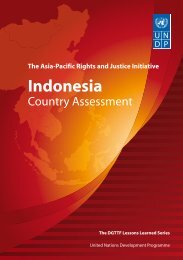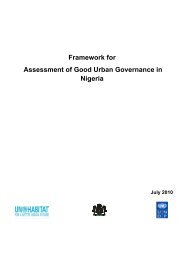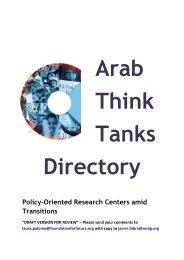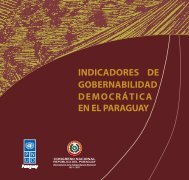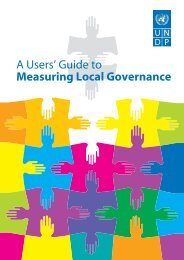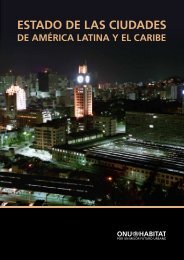planning a governance assessment - United Nations Development ...
planning a governance assessment - United Nations Development ...
planning a governance assessment - United Nations Development ...
You also want an ePaper? Increase the reach of your titles
YUMPU automatically turns print PDFs into web optimized ePapers that Google loves.
Section<br />
2<br />
Governance Researchers<br />
Over the years, many actors have become involved in assessing <strong>governance</strong>. This section attempts to identify participants<br />
and how they may either fit or not into a country-led <strong>governance</strong> <strong>assessment</strong>. Potential partners may include:<br />
International teams that conduct survey-based <strong>assessment</strong>s often have superior survey research skills, but lack the inside<br />
knowledge needed to get good-quality data and draw representative samples in many places where census data is out<br />
of date and other challenges are present. Usually there is minimal ownership of the process by the government or local<br />
stakeholders. International teams are expensive and not really suited for country-led <strong>governance</strong> <strong>assessment</strong>s.<br />
External experts are commonly used in desk studies where little or no original data are collected. These experts often<br />
do not reside in the country they are assessing and thus have very little in-country ownership of the <strong>assessment</strong> process.<br />
External experts are often quite expensive.<br />
Local independent research companies may lack capability and experience, but generally have a good feel for the<br />
cultural context and other local or indigenous issues. The quality of these organizations varies widely from country to country.<br />
Established high-quality companies can be costly. For instance, in sub-Saharan Africa there has been significant growth<br />
in the number of high-quality research organizations. The Afrobarometer is now beginning its fourth round in 19<br />
countries and has earned a solid reputation for conducting high quality research by working with independent research<br />
organizations in each country. When considering a local research firm, principals in the firm should have advanced<br />
degrees in a social science (such as sociology or political science) and at least one staff member should have some<br />
statistical and data analysis training. Contacting past customers is also a good way to make sure one hires the right company.<br />
For country-led <strong>assessment</strong>s to be feasible in the long run, local researchers will need to be realistic in the prices they charge<br />
for their work. Most countries simply will not be able to afford to pay “donor prices”.<br />
Nationally based academics have conducted <strong>governance</strong> <strong>assessment</strong>s in several countries. For instance in Tanzania,<br />
researchers from the University of Dar es Salaam have been conducting democracy <strong>assessment</strong>s for more than 10 years<br />
with the REDET project, funded by Denmark’s development agency DANIDA. As with local research organizations, the<br />
quality of academics varies for <strong>assessment</strong>s relying on survey data, especially in terms of indicator and questionnaire<br />
development and sampling. For archival research, it is always a good practice to look for someone who has successfully<br />
published a book or published in peer-reviewed journals. One advantage of contracting nationally based<br />
academics is that these researchers often have talented and dedicated graduate students as research assistants.<br />
Fees charged by local academics vary considerably. Academics may also need to adjust their fees downward from<br />
“donor levels” for nationally based <strong>assessment</strong> to be financially sustainable.<br />
National statistical offices (NSOs) have the capacity and experience to conduct high-quality <strong>governance</strong><br />
<strong>assessment</strong>s. Recently, these organizations have expressed increased interest to conduct country-led <strong>governance</strong><br />
<strong>assessment</strong>s. Développement et insertion internationale (DIAL) a French development organization, has already<br />
worked with several NSOs primarily in francophone countries in sub-Saharan Africa and in Latin America. More detailed<br />
information about the DIAL’s 1-2-3 project, and the costs associated with some of the approaches discussed above,<br />
can be found in Section 11 of this guide. Experience and capacity are clearly positives. However, in some countries NSOs<br />
<br />
Planning a Governance Assessment: A Guide to Approaches, Costs and Benefits




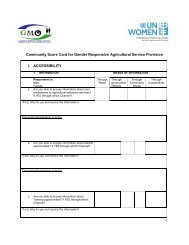
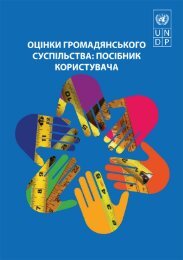
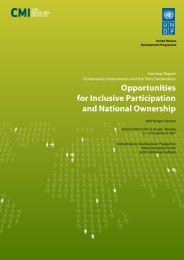
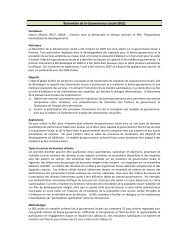
![GuÃa del Usuario ] - Governance Assessment Portal](https://img.yumpu.com/44740603/1/190x253/gua-a-del-usuario-governance-assessment-portal.jpg?quality=85)
